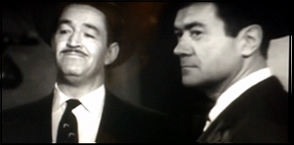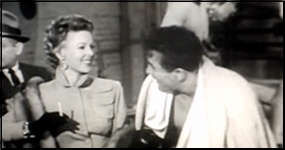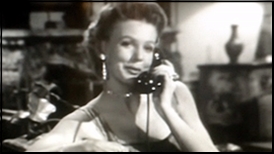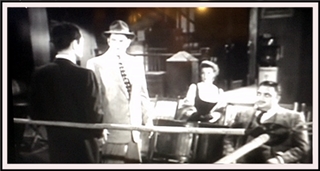Fri 19 Mar 2021
A TV PI Mystery Episode Review: STAGE 7 “The Long Count†(1955).
Posted by Steve under Reviews , TV mysteries[5] Comments

STAGE 7. “The Long Count.†CBS, 27 March 1955 (Season 1 Episode 9). Frank Lovejoy (McGraw), Joan Vohs, Ted de Corsia, Biff Elliot, Nestor Paiva, Mel Welles, Richard Deacon. Screenplay by Federic Brody, based on a story by John Roeburt. Director: Alvin Ganzer. Currently available on YouTube.
Research on the early days of network TV is still spotty at best. There is an individual entry for this episode as being shown on Four Star Playhouse, but when you look at the episode list for that series, it is nowhere to be found. Yes, Frank Lovejoy played PI-for-hire McGraw (no known first name) at least twice on that series, but this particular episode (with all of the same stated crew and cast members) is also listed as the ninth episode of Stage 7 for its one and only season.

These early episodes for both series preceded, of course, the series Meet McGraw, which ran on NBC during the 1957-58 season. For a more on that series, check out Michael Shonk’s overview of it for this blog several years ago. (Follow the link.)
In “The Long Count,†McGraw is hired by a prizefighter’s behind-the-scenes manager to keep him away from dames before an upcoming bout, but the guy slips out on him and manages to get killed by a hit-and-run driver. The boxing business being what it is, there are a lot of suspects, but McGraw manages to name the killer well within the 30 minute running time.

The dialogue is fine, the production values quite acceptable, especially for the era, but the plot is a little threadbare and to me, Frank Lovejoy seems a little tired of the whole thing. One bright spot is the suitably sexy Joan Vohs, who both narrates and plays the manager’s girl friend. Only problem with the latter, storywise, is that “Pretty Boy†Mendero (a well-cast Biff Elliot) has an eye out for her, too.
In any case, there are a few other adventures of McGraw online, either from Four Star Playhouse or the Meet McGraw series itself. Given time, I enjoyed this one well enough to watch some of the others.

March 19th, 2021 at 11:06 pm
Doing some further Googling, here is what I have just learned, in this case from Wikipedia, which says this about STAGE 7:
“Stage 7 is the title of an American TV drama anthology series that aired in 1955. This program premiered in December 1954 with the title Your Favorite Playhouse with all episodes being repeats from other series, but later featured original episodes.”
Which means that “The Long Count” could have appeared on FOUR STAR PLAYHOUSE, and was picked up to be repeated on STAGE 7. Now to find solid evidence that it did appear on FSP first.
March 19th, 2021 at 11:17 pm
The date stated on IMDb for its appearance on FSP is 25 March 1954 but without a season/episode number.
But when you go to the FSP episode list, you find the following:
Season 2, Episode 26. 18 March 1954 “Lady of the Orchids”
Season 2, Episode 27. 1 April 1954. “The Book”
And that’s where I am so far. I won’t spend any more time on this, but you’re certainly welcome to, if you’re so inclined. What’s a whole lot more important, I’m sure, is that this particular episode exists and can still be seen today.
Here’s the link:
https://www.youtube.com/watch?v=OrkEp4qEEBE
March 20th, 2021 at 1:18 pm
I love this series, a PI that was different with a very good actor. Wish the series was in DVD or that someone would write more adventures.
March 20th, 2021 at 1:28 pm
That’s for sure. An official release of all of the shows that still exist would be great, but I somehow don’t think that that’s going to happen. Luckily as I said somewhere above, quite a few can be seen on YouTube and other sites.
March 20th, 2021 at 9:48 pm
I always thought Lovejoy made an ideal private eye on the small screen and wished he had a big screen outing as one too.
The McGraw episodes I’ve seen were pretty good and often moved around fairly ambitiously for a series from that period. It can be fun too spotting some of the actors in minor roles who later became television and movie staples.